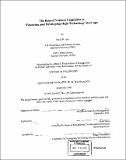| dc.contributor.advisor | Scott Stern. | en_US |
| dc.contributor.author | Hsu, David H | en_US |
| dc.contributor.other | Sloan School of Management. | en_US |
| dc.date.accessioned | 2005-08-23T18:37:08Z | |
| dc.date.available | 2005-08-23T18:37:08Z | |
| dc.date.copyright | 2001 | en_US |
| dc.date.issued | 2001 | en_US |
| dc.identifier.uri | http://hdl.handle.net/1721.1/8248 | |
| dc.description | Thesis (Ph. D.)--Massachusetts Institute of Technology, Sloan School of Management, 2001. | en_US |
| dc.description | Includes bibliographical references (leaves 142-150). | en_US |
| dc.description.abstract | This dissertation addresses the interaction between venture capitalists (VCs) and start-up development through three essays. A common theme is that VCs serve important extra-financial and information brokering roles. In the first essay, using the setting of entrepreneurs obtaining financing from VCs, I empirically evaluate a market for affiliation with prominent partners. I hypothesize that the price for association is increasing in the prominence of the affiliation partner. By assembling a novel sample of start-ups with multiple financing offers, I analyze offers made by competing VCs at the first professional round of funding, holding characteristics of the start-up fixed. The estimated effects are economically significant, with a doubling of a VC's industrial deal experience in a start-up's industry, for example, associated with a six to nineteen percent discount in price paid to acquire start-up equity. The second essay, co-authored with Joshua Gans and Scott Stem, explores the determinants of commercialization strategy for start-up innovators by examining whether start-ups earn their returns to innovation through product market competition as opposed to cooperation with more established firms (either through licensing, strategic alliances or outright acquisition). Three variables in the start-up's commercialization environment affect the relative returns to a cooperative commercialization strategy: (a) the control of intellectual property rights (IPR), (b) low transaction costs, and (c) the cost of sunk assets associated with product market entry. | en_US |
| dc.description.abstract | (cont.) While the main finding is that control of IPR increases the relative return to cooperation over competition, we also find evidence that association with VC facilitates a cooperative strategy by lowering transaction costs to accessing information channels. The final essay examines the evolution of VC practices at one early and influential VC firm, American Research & Development (ARD), and the entry of alternative organizational forms in financing and developing early stage firms. The ARD case highlights the important practices associated with VC, and ARD's evolution of financing practices. Structural and business environment factors of VC seem to both leave a funding gap for early stage start-ups and concentrate investments, as measured by industrial sector and geographic location. Alternative organizational forms seem to have arisen to address these opportunities. | en_US |
| dc.description.statementofresponsibility | by David H. Hsu. | en_US |
| dc.format.extent | 150 leaves | en_US |
| dc.format.extent | 11287563 bytes | |
| dc.format.extent | 11287317 bytes | |
| dc.format.mimetype | application/pdf | |
| dc.format.mimetype | application/pdf | |
| dc.language.iso | eng | en_US |
| dc.publisher | Massachusetts Institute of Technology | en_US |
| dc.rights | M.I.T. theses are protected by copyright. They may be viewed from this source for any purpose, but reproduction or distribution in any format is prohibited without written permission. See provided URL for inquiries about permission. | en_US |
| dc.rights.uri | http://dspace.mit.edu/handle/1721.1/7582 | |
| dc.subject | Sloan School of Management. | en_US |
| dc.title | The role of venture capitalists in financing and developing high-technology start-ups | en_US |
| dc.type | Thesis | en_US |
| dc.description.degree | Ph.D. | en_US |
| dc.contributor.department | Sloan School of Management | |
| dc.identifier.oclc | 50323667 | en_US |
